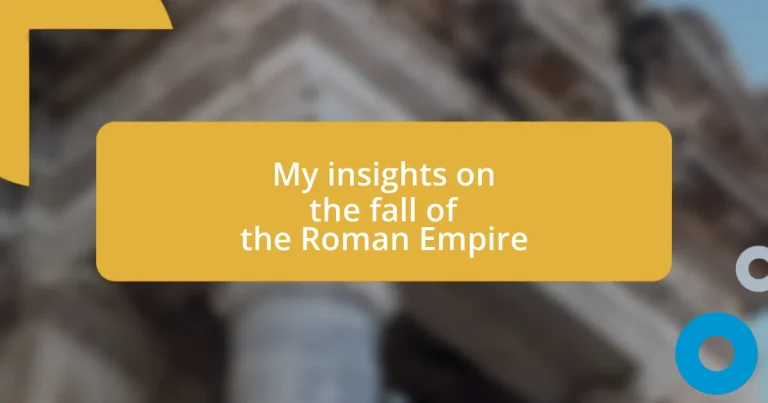Key takeaways:
- The Roman Empire’s decline resulted from a combination of political corruption, economic instability, military overextension, and cultural shifts, leading to a fractured society.
- Heavy taxation, reliance on slave labor, and inflation severely impacted the economy, causing widespread despair and diminishing the quality of life for citizens.
- The rise of Christianity and changing cultural values undermined traditional Roman identity, highlighting the importance of maintaining community cohesion amid societal changes.
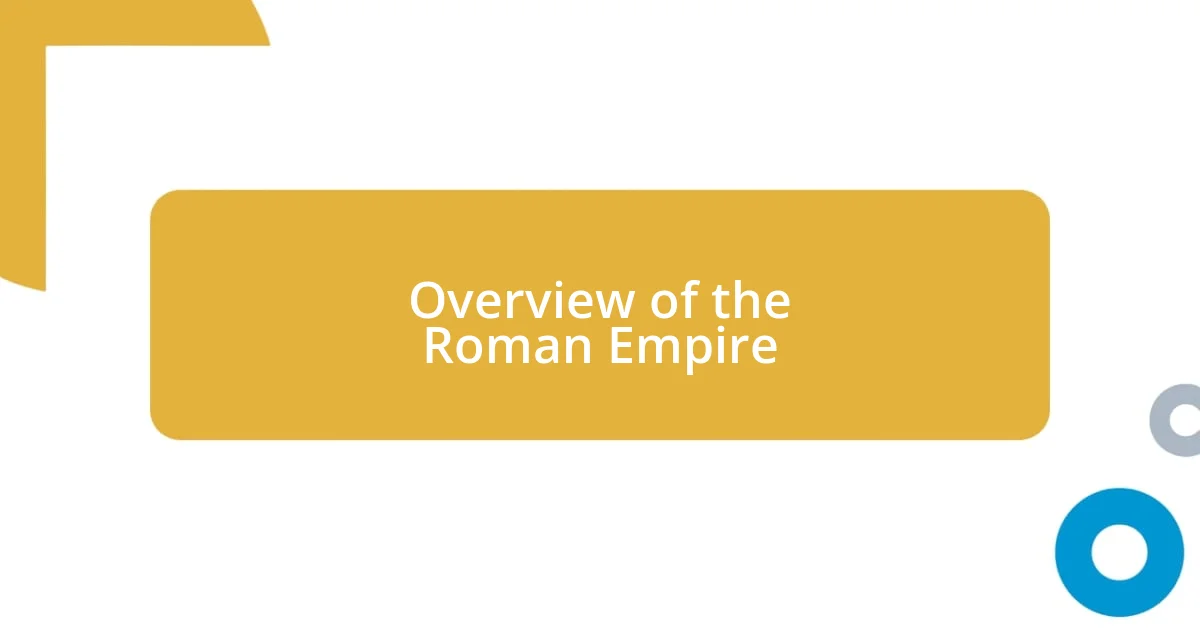
Overview of the Roman Empire
The Roman Empire, a powerhouse of civilization, spanned three continents at its height, including Europe, North Africa, and parts of Asia. I often think about how vast and diverse it was—imagine the different cultures and languages coexisting under one rule! This combination of governance, military might, and cultural integration paved the way for significant advancements in engineering, law, and the arts.
At its core, the empire was built on a blend of strength and adaptability. I remember reading about how the Romans absorbed elements from the Greeks and other cultures; it made me appreciate their desire to learn and evolve. Doesn’t that inspire us to think about how we can adapt in our own lives today?
However, despite its grandeur, the empire faced immense challenges, including economic struggles and political corruption. I can’t help but wonder—could those flaws have been avoided? Reflecting on this, I realize that the complexities of leadership and governance are timeless challenges that resonate even in modern scenarios.

Key Factors of Decline
The decline of the Roman Empire was not just one event but a complex interplay of several key factors. In my mind, the most glaring issues were political corruption and economic instability. I’ve always found it striking how leadership can make or break a civilization; just think about your workplace—when the management is ineffective, it’s easy for everything to fall apart.
Key factors of decline include:
- Political Corruption: Leaders prioritizing personal gain over the welfare of the state.
- Economic Decline: Heavy taxation and reliance on slave labor undermined economic progress.
- Military Overextension: The empire expanded too quickly, straining resources and weakening defenses.
- Social Unrest: Growing inequality and dissatisfaction among various social classes.
- Barbarian Invasions: Constant pressure from outside forces contributed to territorial losses.
Reflecting on these factors, it makes me realize how interconnected everything is. I once read about a small local business that failed because they ignored customer feedback; this reminded me how the empire neglected its people. Essentially, when the foundation weakens, the structure inevitably follows.
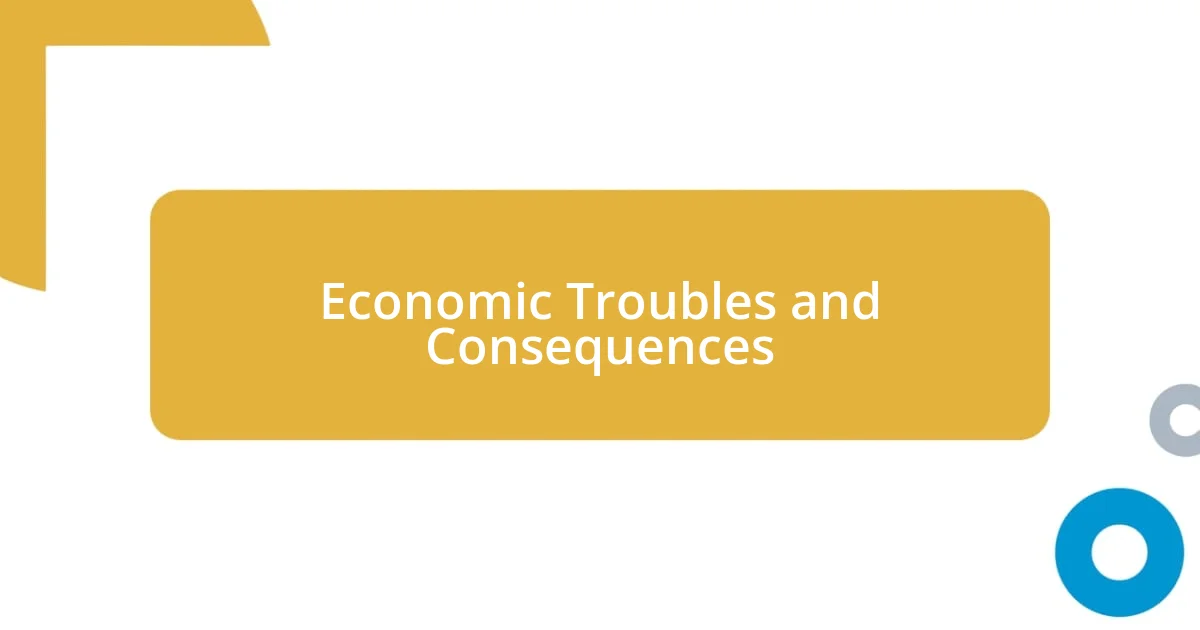
Economic Troubles and Consequences
Economic challenges played a pivotal role in the decline of the Roman Empire. Tax burdens became increasingly heavy, placing immense strain on the populace. I recall a story of a small farmer struggling to keep up with taxes—his plight reflects the broader suffering of Roman citizens who faced diminishing returns. Unfortunately, many had to sell their lands or face bankruptcy.
Inflation also wreaked havoc on the Roman economy. Coins, once valued for their precious metal content, were devalued as the government resorted to minting more currency. I think about how a sudden price hike at a local store can affect my budget—imagine the chaos when essential goods suddenly cost a fortune! This was the reality for many Romans, leading to a pervasive sense of despair among the populace.
The reliance on slave labor further compounded these economic troubles. As the empire expanded, the influx of slaves stifled innovation and initiative. I’ve often related this to modern workplaces where creativity can be lost when teams are too reliant on automation. It made me wonder if the Romans felt the same way; perhaps they mourned the loss of skilled laborers who could contribute to new ideas and technologies.
| Economic Issue | Consequences |
|---|---|
| Heavy Taxation | Increased poverty and land loss among citizens |
| Inflation | Skyrocketing prices leading to widespread despair |
| Reliance on Slave Labor | Stifled innovation and economic growth |
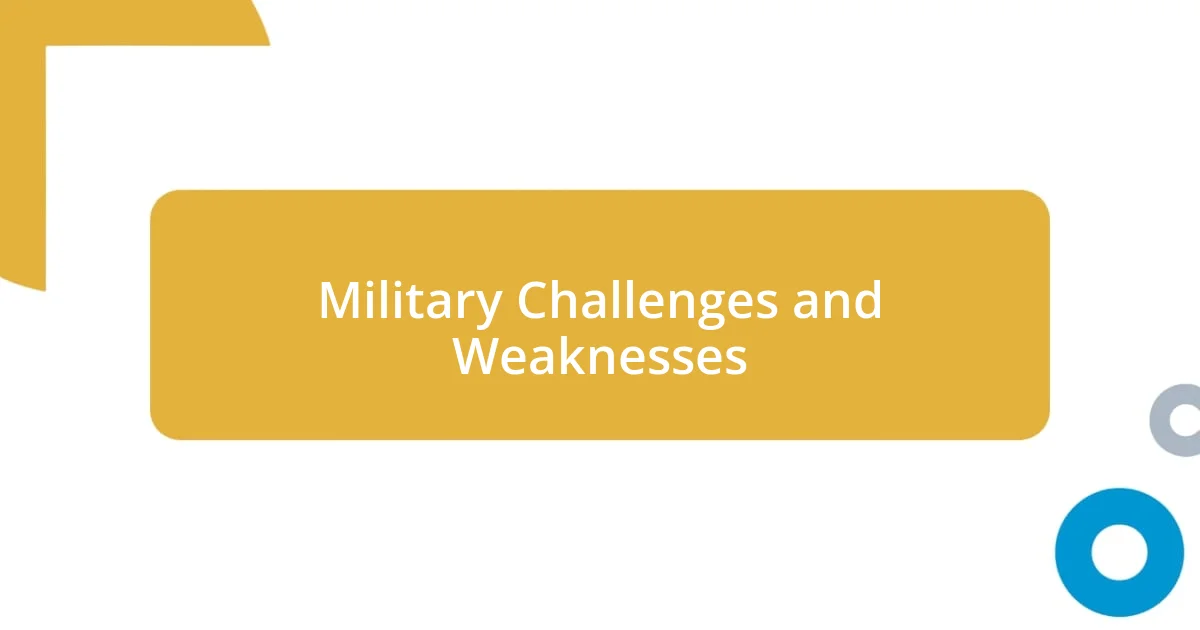
Military Challenges and Weaknesses
The military challenges faced by the Roman Empire were pivotal in its decline. One of the most pressing issues was military overextension. As the empire expanded, securing such vast territories became increasingly difficult. I often think about how one can feel overwhelmed by too many responsibilities at work; the same can happen to an empire. Troops were stretched thin, making it impossible to defend borders effectively against the incessant barbarian invasions.
In addition to overextension, there was a troubling reliance on mercenaries. These soldiers, often motivated by money rather than loyalty, lacked the commitment to protect the empire. It’s akin to hiring temporary staff who only show up for a paycheck—how invested can they truly be? This lack of allegiance led to divisions within the ranks and diminished the military’s overall effectiveness, leaving gaping holes in Roman defenses.
Moreover, the quality of military leadership diminished over time. I remember a mentor of mine who always emphasized the importance of strong leadership in achieving success. The Romans, however, saw a decline in capable commanders due to political corruption and infighting. When leadership falters, the consequences can be dire. Without the right direction, even the most skilled soldiers can’t perform their best, ultimately leading to a weakened military and, eventually, the empire itself.
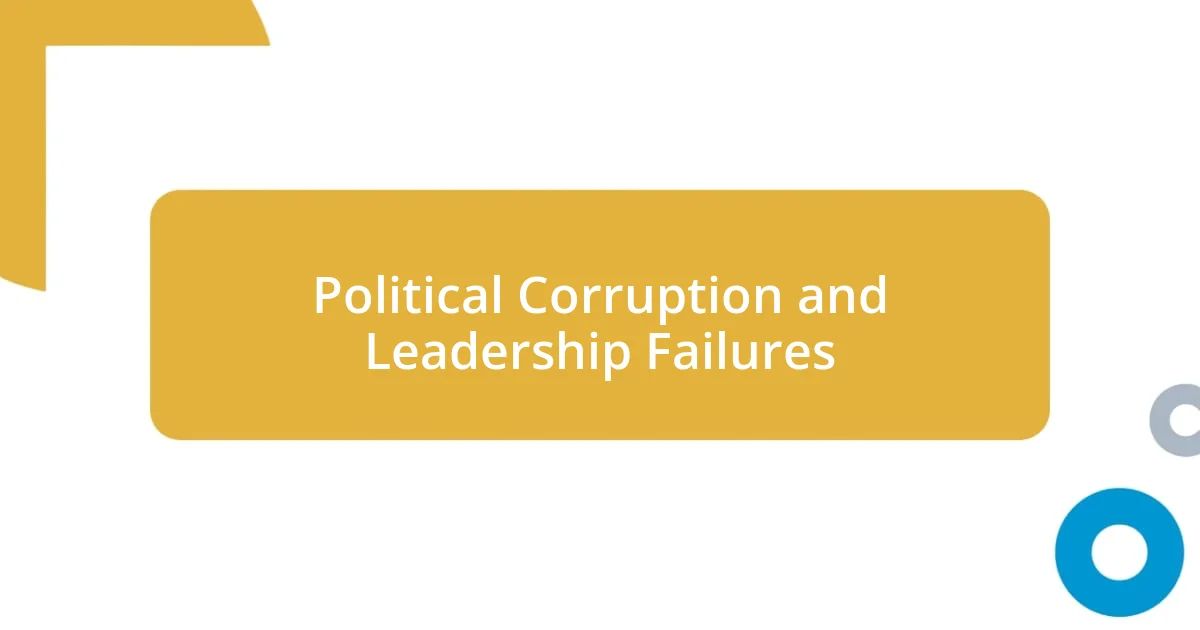
Political Corruption and Leadership Failures
Political corruption gnawed at the heart of the Roman Empire, epitomizing the failure of leadership to prioritize the common good. I often think of a local governance issue I faced in my community—when leaders prioritize their interests over those they represent, trust erodes. Imagine what happened in Rome, where bribes and favoritism became rampant. This created a toxic environment where decisions benefitted a select few rather than the broader populace, further driving a wedge between citizens and governance.
The emperors themselves often exemplified this leadership failure. I recall reading about Emperor Nero, whose extravagant lifestyle and neglect of state affairs mirrored the reckless abandon of so many modern leaders today. How can one govern effectively when more time is spent hosting lavish parties than addressing pressing societal issues? Such leadership not only contributed to administrative chaos but invited contempt from citizens who could visibly see their leaders’ detachment from reality.
Moreover, the internal power struggles within political circles only compounded the issue. I once experienced the division caused by clashing priorities in a project team—when conflict reigns, progress stagnates. Imagine that but on a grand scale. As factions fought for their own interests, the stability of the empire crumbled, leaving vast territories vulnerable. It’s hard to fathom how a once-great civilization could destabilize because of its own leaders’ selfish ambitions.

Cultural Shifts and Their Impact
Cultural shifts within the Roman Empire were essential in shaping its trajectory toward decline. As the empire expanded, it assimilated diverse customs and ideas from conquered peoples. I often think about how my perspective changes when I travel to new places. Just like that, the Romans found themselves grappling with new beliefs that sometimes clashed with traditional values. This blending and, at times, conflict of cultures led to a loss of a unifying Roman identity, which can be incredibly disorienting, don’t you think?
The rise of Christianity marked a significant cultural shift, offering a new moral framework that challenged existing social norms. When I encountered diverse ideologies in my own life, I saw how they made me reevaluate my values. For many Romans, the acceptance of Christianity stirred questions about loyalty to the empire versus spiritual allegiance. How could you balance faith and patriotism when the two appeared to be at odds? This internal struggle caused divisions among the populace and weakened the social cohesion that had kept the empire united.
Additionally, shifting cultural values began to reshape priorities within Roman society. I remember when a new trend emerged in my community, and suddenly, what once seemed significant faded into the background. This occurred in Rome as wealth and leisure became more desirable, overshadowing civic duty and military service. When people prioritize personal gain over communal responsibility, the foundation of society begins to erode. Focusing on individual desires inevitably leads to a diminished sense of collective strength, contributing to the empire’s unraveling in the long run.

Lessons from the Roman Fall
Despite its grandeur, the fall of the Roman Empire offers stark reminders about the importance of maintaining a cohesive identity. Reflecting on my own experiences, I remember the moment a beloved local tradition faced decline due to new, flashy activities that overshadowed it. It made me realize how easily a community can lose its essence when people stop valuing what once unified them. Just as Rome experienced a fracture in its identity, we must ask ourselves: what elements bind our communities together, and how do we protect them from being overshadowed by trends?
The gradual prioritization of personal luxury over communal duty in Rome resonates deeply with me, especially looking back at friends who lost sight of shared goals in pursuit of individual achievements. I witnessed a similar dynamic during a collaborative project where some team members prioritized their own accolades over our common objectives. This self-centered mindset served only to drag the entire team down. The Romans faced much greater stakes, of course. When citizens shift their focus from collective strength to personal gain, the foundations of society weaken—and it seems alarmingly relevant in today’s world.
I can’t help but feel a sense of urgency when discussing how political strife fragmented Roman society. It reminds me of periods I’ve experienced when a divisive leadership change left my community polarized and unsure of its direction. In Rome, these back-and-forth struggles for power created an environment of distrust and skepticism. Can we learn from how fragile unity can become when leadership fails to prioritize collaboration? When empathy and understanding take a backseat, entire civilizations can unravel. To avoid repeating history, we must foster connections and remain vigilant against the distractions that can lead to our downfall.












